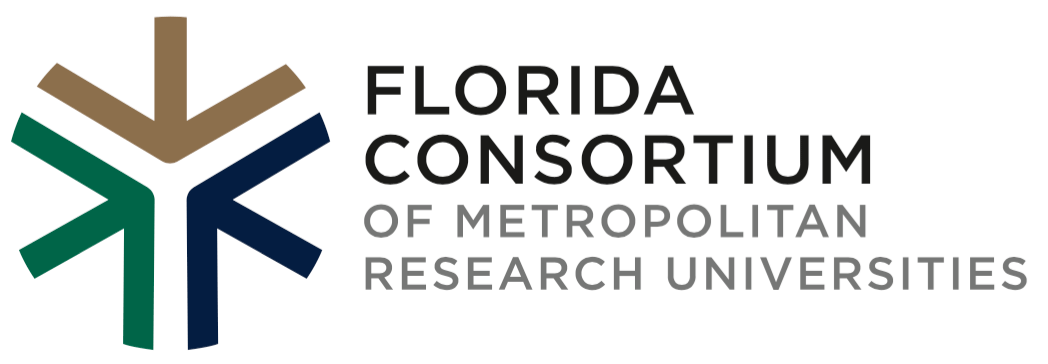STEM College to Career
The Florida Consortium of Metropolitan Research Universities builds bridges between students, faculty, and administrative staff at Florida International University, University of Central Florida, University of South Florida, metropolitan research universities in the Sunshine State with the shared goal of increasing student success.
The Obstacle
Science, Technology, Engineering and Math fields of study require foundational courses such as calculus and physics. Students that make it through K-12 education without this exposure are at a disadvantage when they enter college.

"I knew from a young age that I wanted to be an engineer"
- Haley Galindo, USF Student
The Opportunity

Infusing the “talent pipeline” with career-ready STEM graduates is critical in Florida and across the nation. There are shortages in STEM graduates across the nation, and Florida’s major metropolitan universities play a critical role in helping our state to excel in competitive markets.

Nationally, the Department of Commerce reports that STEM degree holders enjoy higher earnings, regardless of whether they ultimately work in the STEM field. Success in STEM education is a win for students and the communities they live in.

According to the Florida Chamber of Commerce, overall job growth through 2021 will be about 12 percent. Data from the Florida Department of Economic Opportunity shows that STEM job growth should double from its current rate.

The labor demand for those in the STEM field will increasingly outweigh the supply. According to a 2015 report by the President's Council of Advisors in Science and Technology, the U.S. will need 1 million more STEM trained workers than we are currently producing in order to keep up with employer demand (Bureau of Labor Statistics, 2015).
In 2018, there were 289,816 jobs posted related
to STEM in the state of Florida
(Burning Glass Analytics, 2019).
Of those open jobs, 71% required a
bachelor’s degree or higher
(Burning Glass Analytics, 2019)
but only 28.5% of Floridians currently hold
a bachelor’s degree
(Florida Department of Education, 2019)
This creates a crisis of talent that must be addressed in
Florida by our colleges and Universities.
The Plan
The Florida Consortium implemented the Network Improvement Communities (NICs) model to help address the challenges of STEM education and employment in Florida, with a specific focus on teaching and learning, transfer success, and employability.
By increasing the efficiency of university programs and the efficacy of students -- helping them get to graduation day faster and with fewer barriers to completing their education -- it becomes possible to fuel that STEM talent pipeline.
The College to Career program focused on teaching & learning, workforce development and the development of external partnerships.
The NICs collaboratively determined the initial specific goals and problem priorities for the STEM College to Career initiative. Focus areas included teaching and learning, workforce development, creating university-employer partnerships, and engaging state and university leaders to act.
Over 18 months, each NIC completed three 90-day cycles working to reconceptualize the problem; prototype possible processes, policies, tools, or practices; and test the solutions identified by the group.
The Funder

In 2017, The Leona M. and Harry B. Helmsley Charitable Trust awarded a $1.5 million grant to the Florida Consortium of Metropolitan Research Universities to support this initiative.

“The grant will help us to foster sustained partnership across institutions and industry that will help our state for years to come,” said

Michael Preston,
Executive Director of the
Florida Consortium.
The Conversation
During the project, NICs convened in Miami, Orlando and Tampa Bay to foster the condition for success in each region.
In Total, the Florida Consortium

Conducted several regional
and statewide meetings

Formulated best practices

Hosted dozens of local meetings

Assembled a full picture of Florida’s
STEM education needs

Provided dozens of sponsorships to conferences
and national gatherings to collect data and ideas
Cornerstone Events
Active Learning
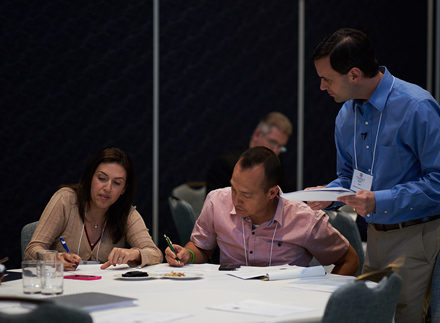

“We just gather here to look at things from a different point of view and different perspectives. I get to see what somebody from USF is doing and what somebody from FIU is doing and we are all doing it for the benefit of the student. A better educator makes a better student and a better learner.”
Marie Léticie, Associate Professor at University of Central Florida
Active learning has become a critical tool for student success because it emphasizes the importance of engaging students in the classroom and gives students a more dynamic education. During the Active Learning Summit, faculty from Florida International University, University of Central Florida and University of South Florida came together to learn strategies and techniques to increase learning and engagement in the classroom. Each faculty member walked away inspired to focus on learning new ideas, incorporating new techniques and improving their classroom experience.
Learning Assistant Workshop
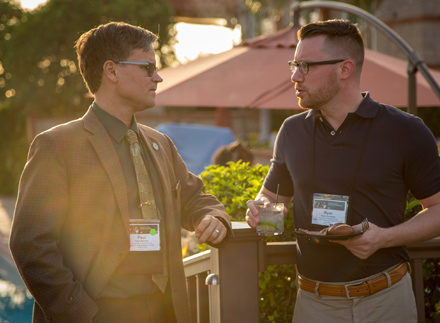

“I get to help students directly. I get to be a bridge between the professor and the student. And I think that my job entails more motivation than facilitating their learning, but motivation in and of itself helps facilitate their learning.”
Albert Sigler, Learning Assistant at Florida International University
Learning Assistants make a large classroom feel smaller for students by providing more individualized support. They are a valuable resource for students and help lighten the load for faculty. The Learning Assistant Workshops provided guidance to teachers who want to implement Learning Assistants effectively in their classroom. Florida International University in Miami – which has already implemented Learning Assistants successfully in the classroom – hosted faculty from universities and state colleges across Florida for this event and graciously shared their experiences.
Focus on First Generation Conference
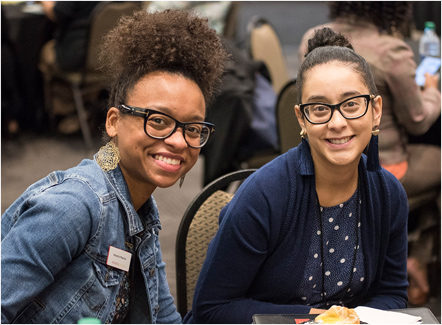

“We highlight our first-generation program because our goal is to provide advocacy through our program for this population of students through scholarships, networking opportunities, financial literacy. We write a lot of grants so we can provide specific programming for these students.”
Tammie Nadeau, [Assistant Director], Multicultural Academic and Support Services, University of Central Florida
First-generation students often face more difficulties. They typically have less social and financial support and tend to be less involved on campus. The Focus on First Generation Conference served as a platform for Academic and Student Affairs professionals to engage and share strategies for building institutional effectiveness, increasing equitable outcomes and supporting the career readiness of first-generation university students.
Presenters demonstrated how to use enrollment data and predictive analytics to support first year students. Attendees also learned qualitative tips and ideas geared toward increasing retention and graduation rates specifically for multicultural and first-generation students based on the experience of faculty and staff members at UCF.
Taste of Science
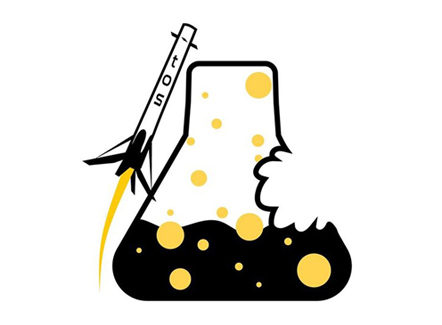

“Science doesn’t stand apart from society, it’s a part of it. We established the Taste of Science festival because we thought local communities should not only care about the research taking place in their back yards, but that they might be inspired by it.”
Parmvir Bahia, CEO of Scientists Inc.
Science is all around us. A stronger appreciation for science helps people be inspired by and understand the world they live in. Taste of Science was a multi-day and multi-location event by Scientists Inc, a local non-profit. This event series aimed to bring findings from the latest scientific research to the public. It encouraged scientists, researchers, and other thought leaders to step into neighborhood venues to discuss the ways science effects our daily lives and encourage curiosity and understanding.
Other Programs
Augmented Reality in Classrooms
Faculty from the University of Central Florida teamed up with Embodied Labs to create Clay Labs, an end of life augmented reality teaching and learning solution.
Learning to communicate with patients who are at an end-of-life point is a crucial skill for health care professionals. It was previously only learned through trial and error, but with this program and Clay, the fictional 66-year-old veteran diagnosed with a terminal illness, students can now practice navigating these tough conversations before they come face to face with the real experience.
Outcomes & Next Steps
Because there are so many aspects that influence a student’s success, the STEM College to Career initiative approach is multi-faceted by necessity.
Long-term outcomes of the project are expected to include:
1
Improved educational outcomes and practices across the college to career continuum
2
Established structures and foundations for sustained collaboration and collective action
3
Spin-off projects enabled by NIC activities and discoveries.
The overarching goal is to create a foundation for sustained partnership across institutions, departments and partners that will yield benefits for years to come. The Florida Consortium looks forward to extending the continuum into the K-12 education system through future projects.
Florida Consortium of Metropolitan Research
12201 Research Pkwy Suite #'s 101N,101P,101K
Orlando, FL 32826
